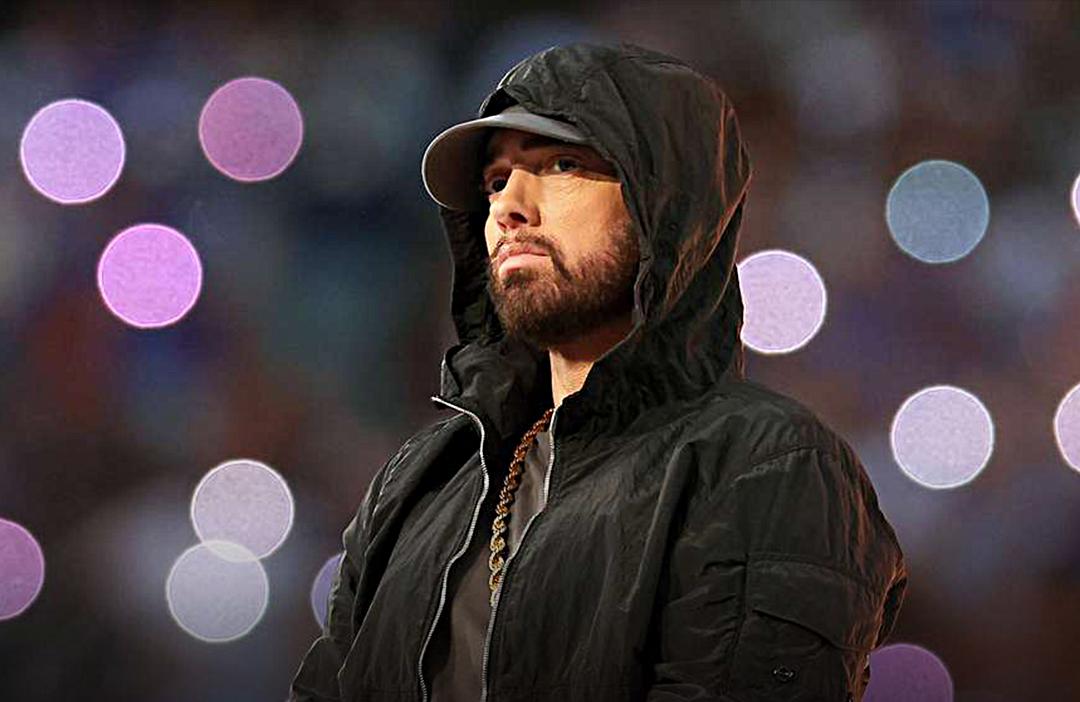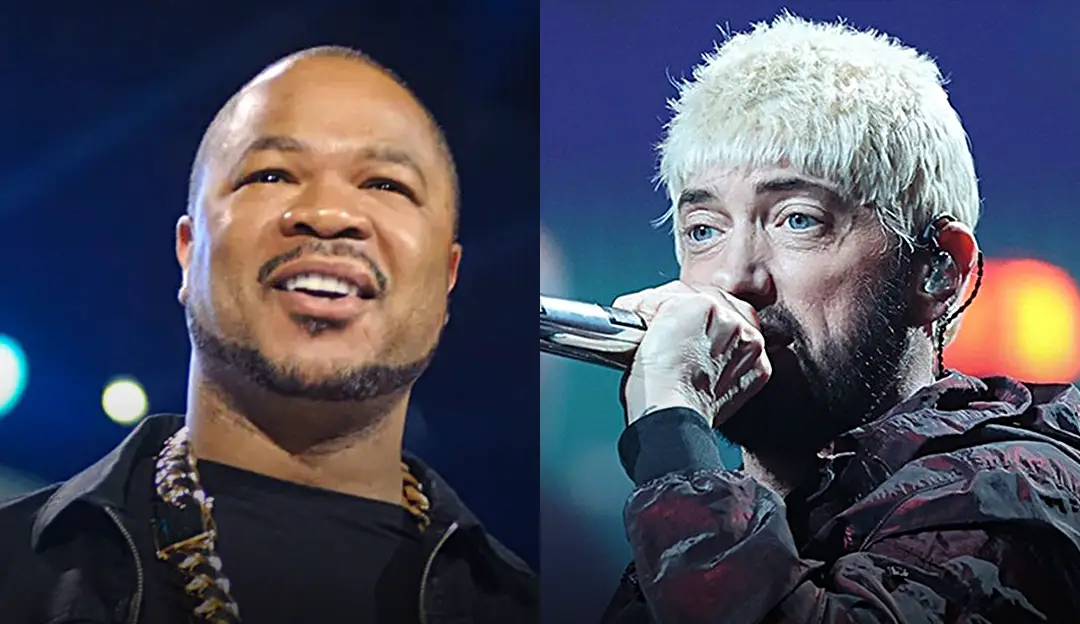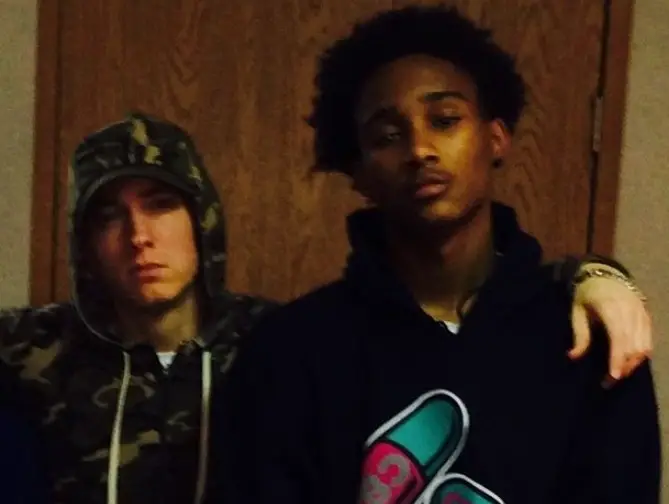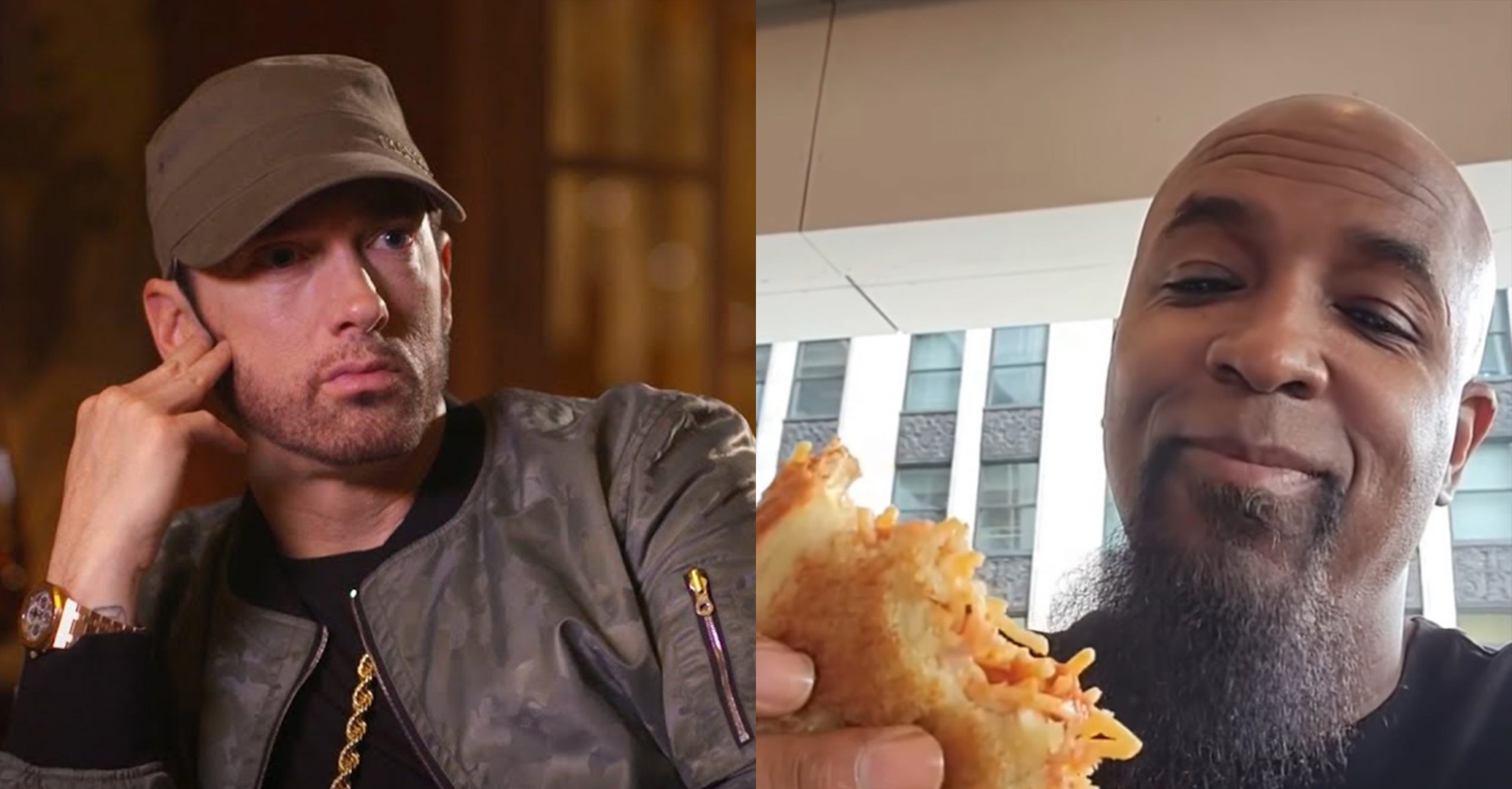Shannon Connellan, Mashable’s UK Editor based in London, has just reviewed Eminem’s “Stans” documentary that premiered at SXSW London. The review shares a lot of detail about the documentary.
Shannon Connellan writes: Eminem documentary Stans leaves you in no doubt, that if you’re not a fan around here, you can GTFO.
While the Shady Films-produced movie does include cultural commentators, famous friends, and music journalists, the doc quite literally centers devoted fans as the primary lens through which to examine Marshall Mathers’ life and cultural impact — those who’ve treasured every album, demo, and mixtape, travelled the world to cheer at concerts, and even had Eminem’s face tattooed 22 times on their body.
In the documentary, these fans are deemed proud stans (though they differentiate themselves by not being “too much like Stan”). Stan is a cultural term around fan culture that’s evolved from being somewhat derogatory to gently celebratory, but one that was ultimately born from Eminem’s 2000 hit “Stan,” in which the artist takes on the perspective of an obsessive fan who murders his girlfriend. “You’re just like me,” the famous refrain goes.
It’s an interesting, unapologetically reverent tactic taken by director Steven Leckart and producers Paul Rosenberg and Tony DiSanto: almost completely tracking an artist’s life and career through the deep knowledge and analysis of fans. It’s an ode to the connection between artistic empathy and mental health, a compelling exploration of fandom itself and parasocial relationships, and — specifically thanks to Eminem’s final line — a middle finger to anyone who has anything negative to say about it.
Stans, ultimately, safeguards itself from criticism. Because if it’s not for you, it’s not for you.
The true heart of Stans, beyond its famous subject, is the collection of Eminem fans interviewed throughout the film. Each proudly takes a seat in front of the camera, introducing themself (of course) with “My name is…” and sharing their stories of discovering and following Eminem’s work. One example is Zolt Shady, a dedicated fan since 2001, whose presence is one of the highlights of the entire documentary, showing us around various Detroit sites from Eminem’s life like a tour guide. These fans share his wins, mourn with him, and simply want him to succeed. Each fan is treated with genuine respect, volunteering their time in the hope that their idol will potentially see their explanation for why they’re fans at all. Importantly, the idea of actually meeting Eminem is not the point here; they just want him to know.
Stans quite literally provides a definition of parasocial relationships here, with each fan speaking about Eminem as friend. The artist himself admits a certain discomfort with the fact that fans visit sites like that of his now-demolished childhood home, saying, “It’s cool that people care, but it’s weird because it’s me.” However, Eminem does self-reflect on his own idols like LL Cool J, who also appears in the documentary, and defines parasocial relationships himself: “You’re like their best friend, and you don’t even know it.”
Despite the titular song being entirely about the topic, Stans pulls back on the very real impact of specifically toxic fandoms, when parasocial relationships go scarily wrong — something Tegan and Sara documentary Fanatical managed with finesse. Any analysis of harmful celebrity worship and harassment is kept relatively contained to a look at the song “Stan” itself, a few comments from Eminem and his famous friends, some thoughts from a fan about what the character Stan would be like in the age of social media, and a montage of some pretty alarming fan letters demanding access and communication.
Instead, the film remains focused on what non-toxic fandom can look like, how people connect with an artist’s work and even survive by it, finding solace in shared experience and their unapologetic “standom.”
While taking a different approach, Stans is still a chronological music documentary, moving through Eminem’s turbulent childhood in Detroit, Michigan, to his early mixtapes and being “discovered” by Dr Dre and Interscope Records’ Jimmy Iovine, through his supercharged path to fame, including the Oscar–winning, box office-topping film 8 Mile (based loosely on Eminem’s own life). As well as assessing Eminem’s impact on hip-hop and the music industry, the film highlights some of the more rapscallion antics of Eminem’s career in Stans, featuring many a bare butt cheek. It feels like you’re moving through an energetic YouTube session — remember when Eminem did/said that? Fans do.
The film mainly tracks Eminem’s discography through fan commentary, with each connecting their own experience to releases including his seminal, controversial second album The Marshall Mathers LP, towering seller The Eminem Show, to his post-hiatus releases Relapse and Recovery. Eminem and his collaborators speak to some of the writing and production of his work, and the toll that being so forthcoming with your own experiences can take. As Eminem says, “I was an open book, and sometimes you want to be able to close that book.”
However, the film for the most part has fans reflecting on how each album has impacted them personally. It’s an intriguing strategy, handing the critical analysis to those who have pored over each lyric with an emotional magnifying glass, and it leads the film to some really touching reflections about loneliness and the power of creative connection.
Through Eminem’s own words and the analysis of the fans, Stans unpacks the onstage persona Slim Shady and how “uncancellable” the artist is behind such a character. However, what Stans refuses to do is adequately examine Eminem’s more controversial statements and homophobic and misogynistic lyrics, whether delivered as Slim Shady or himself. “Anybody with half a brain is going to be able to tell when I’m joking and when I’m not,” Eminem says. The documentary also doesn’t engage any music journalists or cultural commentators with anything critical to say; it’s the Eminem documentary, produced by Eminem, and foregrounding Eminem and his fans. The only music journalist in the entire documentary is Anthony Bozza, Rolling Stone journalist and author of the book, Whatever You Say I Am: The Life and Times of Eminem, and the film pointedly takes pains to patronise past Eminem coverage from the New York Times columnist Maureen Dowd.
Instead, the main talking heads beyond the fans are Eminem’s close collaborators and admirers — Dr. Dre and Jimmy Iovine, Ed Sheeran, Carson Daly, Adam Sandler — all of whom provide insight into Eminem’s impact. But it’s the artist himself who gives the most raw opinions of himself in his darkest days.
Unfortunately, one of the most consistent turns in music documentaries often sees the artist struggling with fame and the pressure of celebrity, which can often lead to problems with mental health and substance abuse. It’s a sadly common tale that seems to come with the territory.
Stans treats its subject, Eminem, with respect throughout this section of the documentary — namely because the artist himself leads the conversation. Through interviews down the camera, bolstered by commentary from his concerned fans, Eminem speaks to his own experience with addiction, which saw the artist almost lose his life after the shocking loss of his best friend and D12 member, MC Proof, who was shot and killed in a club on Detroit’s Eight Mile in 2006.
One of the most raw moments of the documentary sees Eminem speaking frankly about his experience with addiction, revisiting painful memories with regret and determination. The film pairs this with commentary from Dr. Dre about the impact Eminem’s own lyrics about mental health have had on rappers after him, pushing a trend of being open and vulnerable in hip-hop to promote authenticity.
It’s this reverence for Eminem’s authentic expression and persistence through struggle that remains at the core of both his collaborators’ comments and the reflections from fans. Though an overtly reverent documentary, Stans is a compelling, respectful exploration of one of the world’s most successful and famous artists mainly through the experiences and opinions of his fans.
And if you don’t like it, according to Eminem, you can “s*** a fat d***.” For real.
[VIA]



